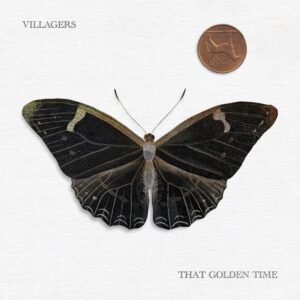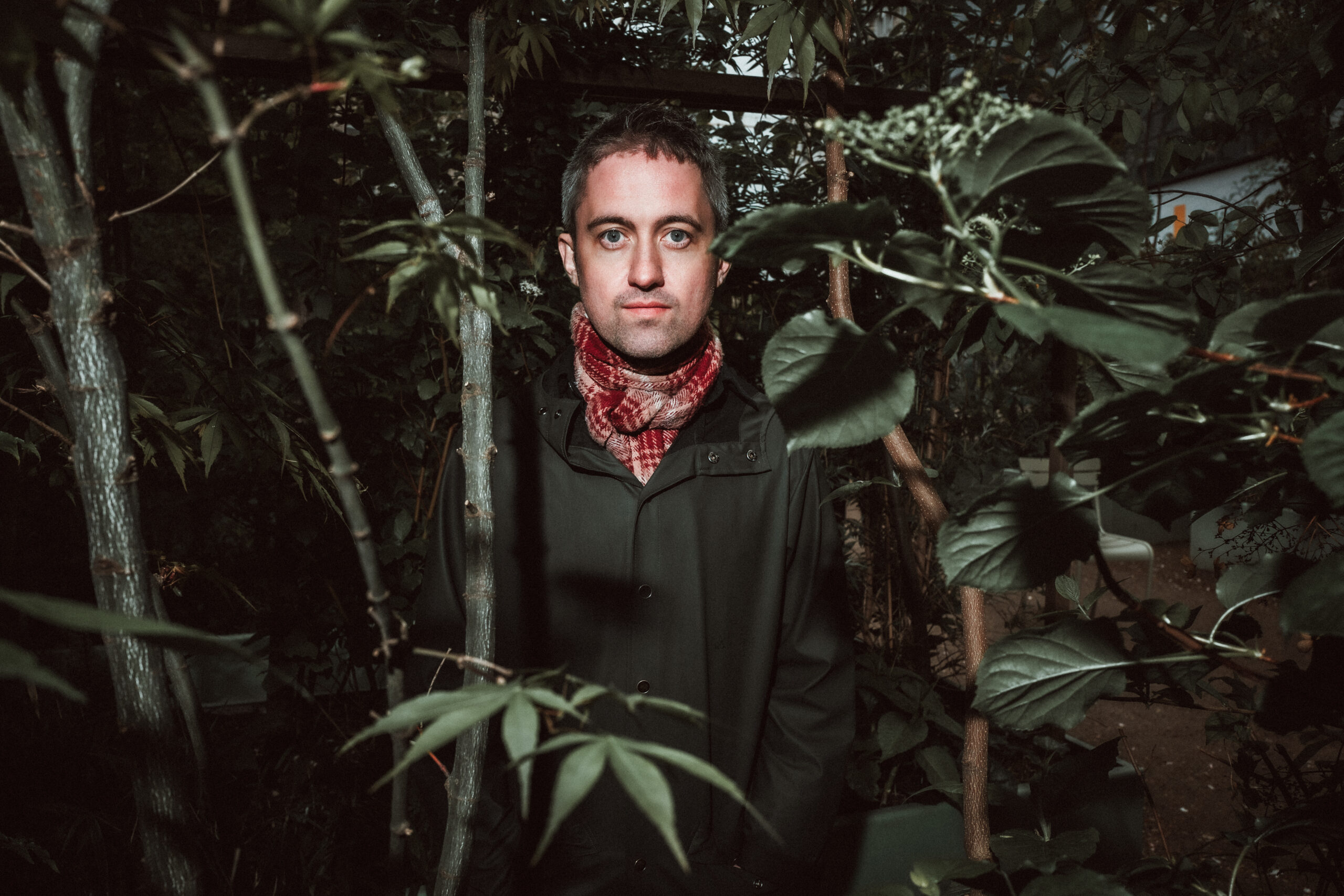 Foto-© Sebastian Madej
Foto-© Sebastian Madej
Die Vorgänger-Platte von Conor O’Brien und seinem Bandprojekt Villagers trug ihren Titel zu Recht: Fever Dreams (2021) war ein bunt schillernder, psychedelischer Fiebertraum von Album, das vielleicht wagemutigste Werk in dieser vor 15 Jahren gestarteten, sehr erfolgreichen Indie-Folkpop-Karriere. Nun erschien mit That Golden Time (VÖ 10. Mai 2024, Domino) eine ganz anders geartete Songsammlung: “Dripping with nostalgia”, wie O’Brien im Interview in Berlin betont, aufs Wesentliche reduziert, zurückhaltend eingespielt und gesungen – und vom ersten bis zum letzten Ton schlicht wunderschön. Für den Villagers-Frontmann ist es ein behutsamer Schritt zurück zu den Wurzeln mit dem fantastischen Debüt Becoming A Jackal (2010) und dem elektronischeren Awayland (2013). Wir haben mit Conor O’Brien (41) über seine feingliedrige Musik, seine Einflüsse und Pläne für die Villagers-Zukunft gesprochen.
Hi Conor, great to meet you here in Berlin. I interviewed you once before, about the Awayland album, but that was only by phone – you spoke from Ireland and you sounded quite ill, with a serious cold.
I was probably hung over. (laughs)
Now your seventh studio album since 2010 is soon to be released, That Golden Time. It sounds quite melancholy and nostalgic to me. So, what is your “golden time”, personally, with this album?
Hmmm, my golden time? The album is dripping with nostalgia, I guess. Probably that’s from getting a little older. For me, the first thing that comes to mind with that question is: any time before the internet existed, really. That’s a golden time for me. I think we lived through this massive shift and how we communicate with each other, even how we dream, even how we imagine things. All of that, even spiritual things are being changed by this new, rapidly changing technology. I think, that’s kind of a main theme I was getting out a little bit.

Is there a common thread, a recurrent theme in the lyrics?
I think, yeah, there’s a few. Value systems, I suppose, these culturally determined values that we have. They are very changeable, history shows they are very changeable. Especially in this internet age. The tension between these culturally determined beliefs and eternally humanistic truths is one of the themes perhaps.
Fever Dreams was made in Covid times, but it didn’t sound like that at all, it sounded like a big bold band record.
It was mixed in Covid times. We were actually recording on the first day of lockdown, a kind of illegally recording. So it was a full band record.

On the other hand, That Golden Time is an intimate, dreamy post Covid album that sounds as if only one or two persons were in the studio.
Yeah, a huge difference. Fever Dreams, that was the first time I brought very unfinished ideas to the band. I didn’t feel comfortable at that, but I made myself do it, because I wanted to see what would happen with this group of musicians that I had toured with for the previous two or three years. So that was quite an experiment for me because I had to let go a lot of preciousness about the songs, and I had to let go a lot of my control. Which is an issue for me when it comes to music I suppose. So that was very playful, it was a lot of back and forth. With this (new album) it was like even when I was bringing these songs to the mastering engineer at the end, the file name was still “Demos”. So you’re hearing the demos of these songs, very built up demos.
How was it done? Did you have a band of old friends again, or was it just you and your instruments?
Well, I played everything on it except for the very ending. Then I got in violin players, a viola player, a cello player, a soprano vocalist, a bouzouki player, a pedal steel guitar player. All the instruments I couldn’t play myself came in at the very end of the process. So it was quite controlled.
If we look at the ten new songs – which ones are most important to you, which ones mostly define the mood and the storyline of That Golden Time?
I kind of keep changing my feelings about that. But at the moment there’s a song called Behind That Curtain…
 Yes, for me that’s one of your very best songs ever. Musically the most fascinating song on the new album because it changes its direction completely after five minutes or so, from a sad soundtracky ballad to electronic beats and jazzy clarinet.
Yes, for me that’s one of your very best songs ever. Musically the most fascinating song on the new album because it changes its direction completely after five minutes or so, from a sad soundtracky ballad to electronic beats and jazzy clarinet.
Oh, you like it… Thank you. It has changed so much from the original. I wrote all the lyrics to a completely different tune, kind of an acoustic pop song. But yeah, then I slowed it down. I realized that the words needed a slower base. It wasn’t quite chiming for me. I remember the day I just sat at the piano and closed my eyes thinking of the words and trying to find these kind of jazzy chords: “Oh, that sounds cool…” It was quite difficult because I’m not really a piano player, I don’t know jazz music academically. The second half of the song was completely different as well. Before I put in the electronic clarinet solo, it was actually another really slow section at similar chords as the first half.
Another great new song is No Drama. What is behind that curtain?
It’s dramatic. (laughs) When You look at dating apps – people always write: No drama. I thought that was such a funny phrase. Because life is drama. I couldn’t get that phrase out of my notebook. And I thought it might be funny to write my most melodramatic song and call it No Drama.

In my ears, That Golden Time is Your most beautiful record together with Awayland. How do you estimate the recent album in your catalogue?
I sort of feel a link with the beginnings of Villagers, with the Becoming A Jackal album. There’s something about trying to get under the cover of things, under the cover of superficial things. With Fever Dreams, I was not doing that at all. I was just trying to make a kind of weird, psychedelic, celebratory, brass led record. It was just fun to do, but it was a very different project. This new album is going back to make kind of a psycho drama. like a psychological thriller almost.
Conor, I read your recent Mojo magazine interview, and I was quite surprised of some of your musical choices. Björk, Radiohead, Weyes Blood – ok. But Ennio Morricone, or Terry Riley? You have quite a broad taste.
Yes. Because I love music a lot. Whenever this question is asked: What’s your favourite album of all time… I never have the same answer. Yeah, Morricone – I cry a lot when I hear his music, even some of the lesser known films have some of his best soundtracks. My first love of music, when I was a child, was film soundtrack music. That’s what really got me into music. When I was four, or five – I remember crying a lot in the cinema just from chords, from chord changes. Then Terry Riley – his album A Rainbow In Curved Air, I return to that very often. I’ve listened to it so much travelling. Really cool.

Some years ago I read that Martin McAloon of Prefab Sprout compared your Awayland songs to his old band’s. I do find some parallels in Your recent albums, too. Can You see his point?
They’re a band I’ve enjoyed a lot. When I brought out my first album Becoming A Jackal, people were already making comparisons – but, to be honest, I had never heard them. And so I was like: Oh, who’s this? Then when I heard Prefab Sprout, their famous singles: Oh yeah… People assumed I was a fan. When I checked them out I thought that was cool stuff. But I wasn’t so much influenced by them. Perhaps since then a little bit…
There’s a mention of David Hedderman’s new album Pulling At The Briars in your Mojo interview, too. He’s an old friend of yours, a former band colleague of The Immediate, you produced his first solo record. How did you meet again?
We always had close contact. He’s one of my closest friends, he lives in Berlin now. I see him every time I’m here. We just have a schoolboy connection from growing up together. Now when I write a song he might send me a drawing to that. Kind of weird spiritual connection. So it was a pleasure to hear he wanted me to produce his new record. It was just so natural, it didn’t feel like business at all.
In my opinion, the Villagers catalogue – from Becoming A Jackal to That Golden Time – is one of the very best in recent indie pop. If you look back at Your career – are you satisfied with your achievements till now?
I think that’s always the death nail of creativity if you’re satisfied. I don’t really like to feel satisfied – I prefer kind of keep moving and changing. I’m already writing songs for the next record, and they are really different. When You make a record You’re forced to live inside of that record for a year and a half or so. So I’m jumping right back into That Golden Time now because I’m just beginning to promote it and play it live.
Thank you so much for this interview, Conor. Good luck to you!
Villagers Tour (Support: Hamish Hawk)
30.05.24 Hamburg, Christianskirche
01.06.24 Berlin, Passionskirche
02.06.24 Köln, Luxor










